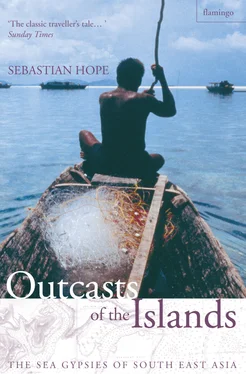Sarani was fascinated by the boat. The twin 200 horsepower outboards lowered into the water at the push of a button, the hydraulics whining. They started at the push of another. He held on as we skimmed over the light chop at what was light-speed in comparison to his boat. It was thrilling to be travelling at thirty-five knots through the bright morning air, the controlled forte of the engines behind us, the sea a precious blue, and on the flood tide we streaked across the Creach Reef. In the Semporna Channel, the water was dead calm and we seemed to be floating above it. The landmarks whizzed past, the mangroved inlet, the detached stilt village, the turn at the south point of Bum Bum into the home strait. The outskirts of Semporna were upon us, the fish farms, and then we were pulling up to the jetty next to the ice house. Sarani was unfazed and started unloading his various empty jerrycans before the boat had been tied up. He set off to find a man who owed him money. Tim ushered the departing guests to the minibus waiting to take them to Tawau airport. I was making plans for a breakfast of fried rice.
The bald lieutenant was in the café with two other men, one in a policeman’s uniform. They both had the sleek air of authority about them and the man out of uniform, the elder of the two, wore rich clothes, a gold watch and a gold ring. The lieutenant called Tim and me over.
‘This is our ex-Deputy Chief, and this is Inspector Amnach of CID.’ The Deputy Chief had been posted to the Peninsula, a post with more responsibility, and he was saying goodbye in his civvies before he left. He had picked a good time to leave, when the whole Semporna establishment was under scrutiny, and he projected self-assurance, knowing his career would always run so. He spoke courteous English and asked Tim about the diving and Tim in his usual manner, at once blunt and long-winded, replied, ‘Sipadan’s great. Mabul is so so. And Kapalai, well, you can forget about Kapalai in a couple of years. Why? Fish-bombing. You ought to come out and see sometime.’ He started a long and repetitive lecture on the stupidity of playing bombs. Every time he seemed to be finishing, he would come up with a different way of saying what he had just said and add, ‘You know what I mean?’ in such a way, raising his eyebrows and wrinkling his freckled forehead, blue eyes wide, lips pursed, as to force one to treat it as a real question and say ‘yes’. Diplomacy was not one of his talents, but his manner was so good-humoured and earnest that it was hard to take offence.
The implied charge of incompetence did not offend the ex-Deputy Chief. He was patient in his rehearsal of the difficulties facing the coastguard in its operations against the fish-bombers. Tim had a solution for every one: the reef is too shallow? use inflatables; they throw the evidence overboard? have divers on hand to recover the bombs. He offered his own services. The ex-Deputy Chief spelt it out.
‘It is not our job to protect the reef. Our job is to catch criminals. Of course the people who are playing bombs are breaking the law, but as I have said we cannot catch them there. Do you know how many reefs, how many islands there are on this coast? We only have posts at Tawau, Semporna and Lahad Datu. If we go to one reef, the bombers go to another. Our operations are concentrated on the detonators. We cannot arrest someone for having an empty bottle or fertiliser or petrol. These are innocent things.’
Конец ознакомительного фрагмента.
Текст предоставлен ООО «ЛитРес».
Прочитайте эту книгу целиком, купив полную легальную версию на ЛитРес.
Безопасно оплатить книгу можно банковской картой Visa, MasterCard, Maestro, со счета мобильного телефона, с платежного терминала, в салоне МТС или Связной, через PayPal, WebMoney, Яндекс.Деньги, QIWI Кошелек, бонусными картами или другим удобным Вам способом.












